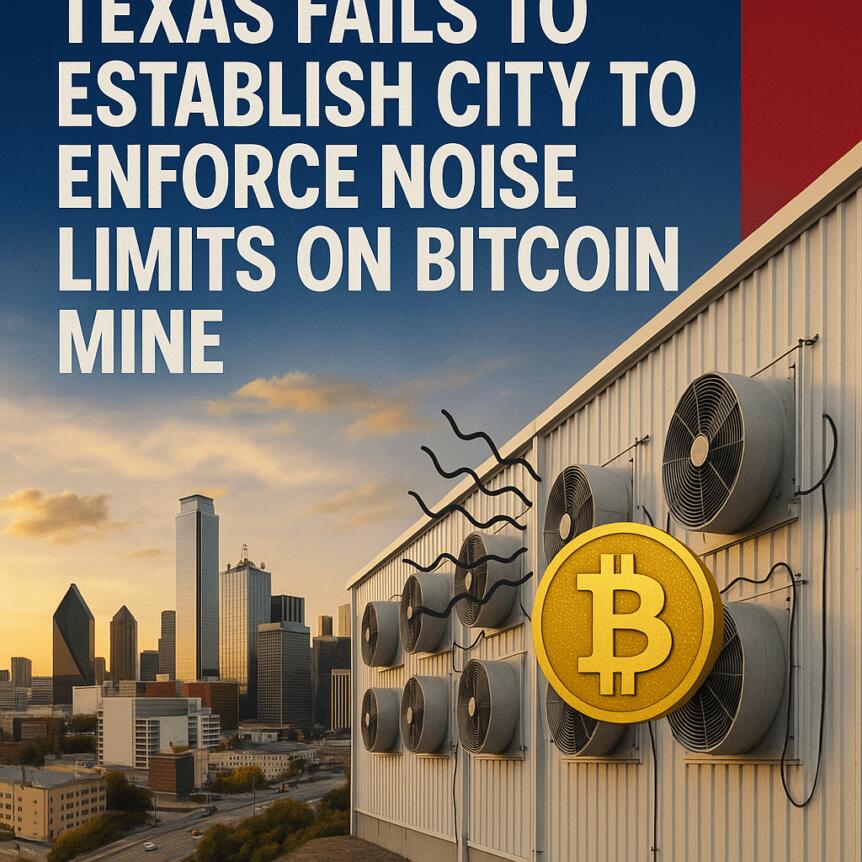Texas Fails to Establish City to Enforce Noise Limits on Bitcoin Mine

Certainly! Here’s a professional, SEO-optimized rewrite of the article with an added introductory paragraph, while maintaining all original HTML structure and format:
—
As the cryptocurrency industry continues its rapid expansion, local communities often grapple with its environmental and noise impacts. In Texas, residents near a large Bitcoin mining operation attempted to form a new municipality in hopes of regulating the noise pollution and addressing quality-of-life concerns. Despite their efforts, the bid was ultimately rejected, highlighting ongoing tensions between crypto miners and local communities concerned about the environmental footprint and noise disruptions from large-scale mining farms.
- Residents in Hood County, Texas, failed to establish Mitchell Bend as a new municipality to restrict noise from a nearby Bitcoin mining facility.
- Only 38% of voters supported the proposal, which would have created a two-square-mile community of around 600 residents.
- Local complaints cite sleepless nights, headaches, and hearing problems caused by MARA’s Bitcoin mining operations.
- MARA attempted to block the vote through legal action but was unsuccessful, though it expressed satisfaction with the outcome.
- Locals vow to continue fighting to curb the mining noise and protect their community’s quality of life.
Residents of a small area in Hood County, Texas, lost their bid to form a new municipality in hopes of gaining control over noise generated by a nearby Bitcoin mining operation. The vote, held earlier this week, saw limited support, with only 38% of 138 voters in favor of creating “Mitchell Bend,” a proposed two-square-mile municipality housing roughly 600 residents.
For nearly three years, the community has complained about the disruptive noise produced by MARA’s 60,000 Bitcoin miners, integral to securing Bitcoin’s $2 trillion network. The loud operation has led to sleepless nights, headaches, and hearing problems, prompting some residents to leave the town. To mitigate noise, MARA has expanded a 24-foot wall and transitioned two-thirds of its cooling fans to a liquid cooling system, but complaints persist.
Source: Texas TribuneDespite ongoing efforts to contain the noise, including building barriers and upgrading cooling systems, residents remain dissatisfied. The frustration has led them to consider formally incorporating Mitchell Bend, which would effectively create a local government with authority to regulate noise and other issues related to mining operations. Currently, Hood County’s population exceeds 70,000, making Mitchell Bend a small fraction of the broader community.
MARA initially sought to block the vote
Prior to the vote, MARA filed a lawsuit in late October to prevent the community’s incorporation, arguing that it could damage its operations and impose additional tax burdens. However, the court dismissed the legal challenge, allowing the vote to proceed. A MARA spokesperson expressed satisfaction with the outcome, stating:
Residents remain committed to fighting noise issues
Local resident Danny Lakey underscored the community’s resilience, stating that although they faced disappointment, their efforts would continue. “Although we took a loss here, we are going to move forward and do what we can to ensure industry does not dominate Hood County,” he said. Prior objections to the mining operations also included legal action against MARA and site manager David Fischer over noise violations, but none of these efforts succeeded.
Similar conflicts have occurred elsewhere, such as in Vilonia, Arkansas, where city authorities unanimously rejected a proposal to host a crypto mining farm following community protests. As the debate over crypto’s environmental and social impact persists, communities and industry players remain at odds over how best to balance growth with quality of life.
This article was originally published as Texas Fails to Establish City to Enforce Noise Limits on Bitcoin Mine on Crypto Breaking News – your trusted source for crypto news, Bitcoin news, and blockchain updates.
You May Also Like

Ethereum unveils roadmap focusing on scaling, interoperability, and security at Japan Dev Conference

XRP price rebounds off lower band as new XRP Ledger wallets surge to 8-month high

